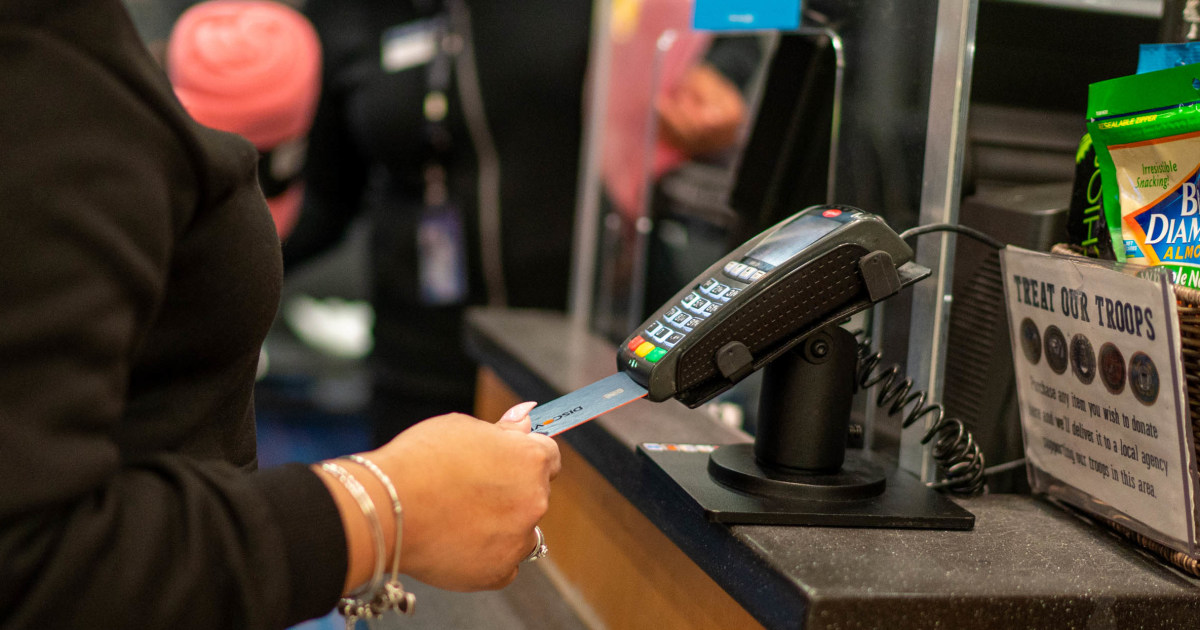By Jessica Dickler—
CNBC
Credit card debt has hit another new all-time high.
Americans now owe $1.08 trillion on their credit cards, the Federal Reserve Bank of New York reported Tuesday.
Balances increased 10% from a year ago, according to a TransUnion quarterly report on the credit industry, and the average balance per consumer reached $6,360, also a record.
“Consumers are spending more,” said Charlie Wise, senior vice president of global research and consulting at TransUnion.
“Although the inflation rate has gone down, that does not mean that prices have also gone down.”
A passenger uses a credit card to pay for her purchases on January 28, 2022 at a store at John F. Kennedy International Airport in New York. Robert Nickelsberg / Getty Images file
In fact, prices continue to rise, although at a slower pace than before.
The consumer price index — a key indicator of inflation — has gradually fallen from a pandemic-era high of 9.1% in June 2022 to 3.4% in December 2023.
Meanwhile, households continue to show signs of strain, with more credit card holders carrying debt from month to month or falling behind on payments.
According to the New York Federal Reserve and TransUnion, credit card delinquency rates across the board increased more than 50% in 2023, the New York Fed reported.
According to the TransUnion study, “serious delinquencies,” meaning nonpayments of 90 days or more, reached the highest level since 2009.
“Consumers are having problems with their payments,” Wise said, and “I think we will continue to see those defaults increase.”
It's not all bad news
“It's not all bad news,” said Ted Rossman, chief industry analyst at Bankrate.
Cardholders who pay their bill in full each month benefit from cash back and travel rewards without paying interest.
“The big dilemma is whether or not you have a balance,” he said.
In that case, credit cards are one of the most expensive ways to borrow money.
According to Bankrate, the average interest rate on a credit card is 20.74%, a record high.
At more than 20%, if you made the minimum payments on this average credit card balance, it would take you more than 17 years to pay off the debt and cost you more than $9,000 in interest, Rossman calculated.
[Why is now a crucial time to pay off your credit card debt?]
Millennials are increasingly turning to credit
Still, consumers often turn to credit cards, in part because they are more affordable than other types of loans.
Overall, 20.1 million new credit accounts were opened in the fourth quarter of 2023, driven in part by
subprime
borrowers seeking additional liquidity, according to Wise.
Subprime
generally refers to those with a credit score of 600 or lower, according to TransUnion.
Many people in this group are millennials, he noted, who are burdened by high levels of student loan debt and the housing affordability crisis.
“If you can't afford to buy and the rent keeps going up, it's not a very happy situation,” Wise said.
How to deal with credit card debt
“My favorite tip is to get a 0% balance transfer credit card,” Rossman said.
He added that there are cards that offer 12, 15 or even 21 months without interest on transferred balances, and “allow high-cost debts to be consolidated into a new card that will not charge interest for up to 21 months, in some cases.”
Borrowers can also refinance a personal loan at a lower interest rate.
These rates have also risen recently, but, with an average of slightly less than 12%, they are still much lower than credit card rates.
If not, ask your card issuer for a lower equivalent annual rate.
In fact, 76% of people who asked for a lower interest rate on their credit card last year got it, according to a report from LendingTree.

